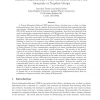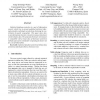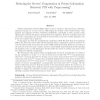330 search results - page 1 / 66 » Controlling data disclosure in computational PIR protocols |
CCS
2010
ACM
13 years 9 months ago
2010
ACM
Private Information Retrieval (PIR) protocols allow users to learn data items stored at a server which is not fully trusted, without disclosing to the server the particular data e...
ISW
2010
Springer
13 years 2 months ago
2010
Springer
A Private Information Retrieval (PIR) protocol allows a database user, or client, to obtain information from a data- base in a manner that prevents the database from knowing which...
SSDBM
2002
IEEE
13 years 9 months ago
2002
IEEE
Statistical database protection is a part of information security which tries to prevent published statistical information (tables, individual records) from disclosing the contrib...
CRYPTO
2000
Springer
13 years 9 months ago
2000
Springer
Private information retrieval (PIR) enables a user to retrieve a data item from a database, replicated among one or more servers, while hiding the identity of the retrieved item. ...
NDSS
2008
IEEE
13 years 11 months ago
2008
IEEE
In [22] we showed that existing single-server computational private information retrieval (PIR) protocols for the purpose of preserving client access patterns leakage are orders o...



